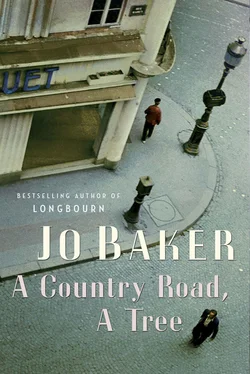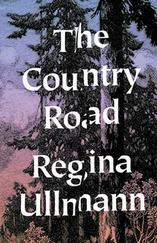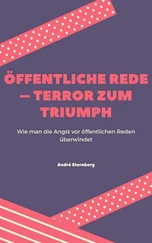—
The train is an adder, barely warmed by the early sun; it moves by inches, eighths, sixteenths. It hardly moves at all.
A layer of smoke hangs over the city; it rises in plumes here and there, sickly-looking and unsettling.
“Do you think that’s an air defence, to screen the people as they leave?”
“Maybe. Or they’re bonfires.”
“Why would they have bonfires?”
“To be rid of stuff they wouldn’t want the enemy to get their hands on.”
They sit shoulder-to-shoulder on the hard wooden bench. There are passengers packed, standing, down the length of the corridor. He chews his nails when he isn’t smoking; when he isn’t smoking he chews his nails. She stares out of the window, her hands in her lap, knees sloped together; his long legs are tucked uncomfortably in. His two bags are wedged behind his heels; her overstuffed backpack is on her lap.
The train creeps past streets; it begins to pick up a little speed. Passengers strike up conversations. Children chatter, swing their feet. A road swerves towards the line and for a moment the two run side by side. The road is a rubbish dump, a mound of junk and clutter. But then it separates itself into movement, individuals, men and women trudging burdened like ants; into cars, donkeys, handcarts, prams, horses, suitcases, bicycles, frying pans and mattresses, birds in cages, briefcases. A child lugging a baby. An old woman in a pram, legs dangling, pushed by an old man who squints in the bright June sun. His eyes catch on the woman’s white, sharp face above the bundled body. The train pulls past the two, the old woman and the old man scraping along together, and then a fence ticks past, breaking up the image like an old zoetrope, and he closes his eyes, and reaches in behind his spectacles to press on them.
When he looks again, a brick wall ghosts alongside and Suzanne’s head is resting against the window; her eyes are closed and she is breathing softly and asleep. He is glad that she’s asleep. He feels as though he could never sleep again.
When Suzanne wakes, they are out in the countryside and the train has picked up speed. He sits glaring out of the window, across the copses, the wide planes of farmland, at the dotted villages and church spires.
“What is it?” she asks.
“The people.”
“What people?”
He nods across the open land, towards the main road south. The way is packed still, cars nudging along, edging past the pedestrians and pony carts.
“Name of God,” she says. “That must be the whole of Paris.”
He says, “Yes. And…”
“What?” She glances round at him.
“And, I think, the army,” he says.
“What?”
“I think I saw uniforms. Before.” He raises his shoulders. His sight is not that good. “I can’t be sure.”
Her face goes still. She turns back to the window. The train skims across a bridge over the road. And then she sees them too. It’s just a moment, and then the train is past and they’re gone. But a pocket of infantry was slumped on the verge, filthy and unkempt, legs stretched out in front of them in the long summer grass.
“But no,” she says. “What are they doing?”
“You see them?”
She nods.
“It must be a rout.”
She sits back, swallows. After a moment: “Maybe there won’t be so much fighting in Paris. If they are running away.”
“That’s one way of thinking about it.”
“Hmm.”
“But the other way is, with the army there, that makes everyone a target.”
“You think they’ll come?”
She turns her gaze up; she searches the sky. The sky remains, for the time being, innocent and clear blue.
—
The train stops unpredictably, and in awkward places. Time ticks by, and people murmur, and children cry.
They are marooned. An hour; an hour and a half. Her stomach rumbles, and she folds her arms over it. The sun glares on them. Her face is pale and sweaty.
“If we were at a station,” someone says, “we could nip out and buy some bread.”
Further up the train, someone thumps open a carriage door and climbs down on to the track. She watches the dark figure pick his way across to the embankment, then stand there at the edge of the grass. It takes her a moment to realize that he’s pissing, and then she looks away. Soon others are climbing down from the carriages to stretch their legs and relieve themselves; women share a cigarette, or clamber further up through the long grass and off into the bushes. Children hopscotch from sleeper to sleeper; a toddler blinks sleepily in the daylight as his mother holds him, pants around his ankles, and he puddles the gravel.
And then there is a whistle and a rush and a general rebuttoning and regathering, and a flurry to get back inside.
The train grinds back into motion, and for a while is clipping along again, stopping sometimes as other trains whistle past, and sometimes stopping for no obvious reason at all.
—
Vichy is cursed; leaves and tendrils and blooms and branches have been bewitched into stone and steel, and forced into service as buildings and street furniture. There is clean cold light here; the streets are glistening and chill.
Together they head down one of the main boulevards. Every step becomes a conscious effort, and he feels as though he is tacking and lurching along like a golem. They’re being watched — discreetly from café terraces, from the security of linked arms, from behind the defensive barrier of a shopping basket or a yapping dog. Children simply stop and stare. Because Vichy is not used to visitors like these: scruffy, exhausted, travel-worn visitors who flood out of third-class carriages with their belongings bulging from their bags and without the means to make themselves comfortable. Wealth, in Vichy, is as normal as the bubbling warm water; here, nobody carries their own luggage.
One bag slides against his thigh as he walks. Murphy, Murphy, Murphy. The other bag drags on his shoulder, stuffed with clothing, shaving gear, tinned food: the body’s barest needs make for a heavy load. If he could just be rid of one of the bags; to shed either his manuscript or his belongings would be such a relief. But he heaves one strap up his shoulder and hooks a thumb under the other, and drags himself along. Suzanne, craned forward by the weight of her backpack, trudges beside him, silent. They carry on, past the tabac on the corner and the pharmacy with its display of Vichy pastilles, the tins piled in a pyramid, and past the milliner’s shop where the hats are ranged like dead birds in a cabinet.
“The Hotel Beaujolais,” he says. “It’s on this street, it can’t be far.”
She nods. Mr. Joyce, it turns out, will be here. She hadn’t known that Vichy would also mean Joyce, would also mean hard drinking and unhappiness. Whatever he might think, Joyce is not what he needs.
—
There is, thank goodness, a room remaining at the Hotel Beaujolais. Suzanne lets her backpack slide from her shoulder and hit the floor.
Dark panelling, cool tiles: a couple of comfortable-looking armchairs. He is desperate for news, but the only paper is a folded copy of Action Française and he’s not going to stoop to that. Though it needn’t mean anything about this place — anybody could have left it there. For the moment at least, they must assume that this is a decent establishment.
And then the receptionist mentions the price of the room.
“Ah.”
The receptionist’s expression — he is a pale fellow with a neat moustache and clear skin — remains neutral, but then the cost is neither here nor there to him.
“You have nothing less…expensive?”
A minor shrug. “No, Monsieur.”
Because at whatever price they’re charging for a broom cupboard nowadays, there’ll be no difficulty in filling it, with Paris emptying itself out like a toppled-over bucket. Vichy can afford not to be cheap. They’ll have to keep on going, find somewhere more suited to their finances; the Joyces’ hotel was always likely to be too grand for them. He glances round at Suzanne, who has left her backpack on the floor where it fell. She is grey with fatigue.
Читать дальше










